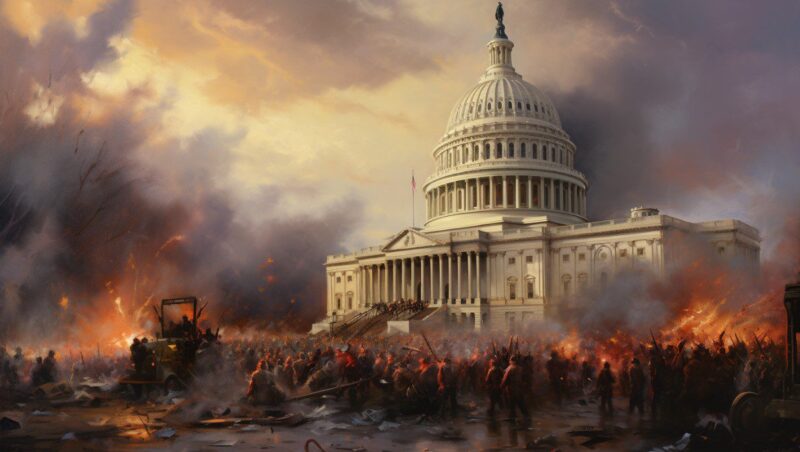
In a landmark decision that has far-reaching implications for the United States’ political and social landscape, former Proud Boys leaders Joseph Biggs and Zachary Rehl were sentenced to 17 and 15 years in prison, respectively, for their roles in the January 6, 2021 Capitol riot.
The sentencing comes at a time when the nation continues to grapple with the volatile cocktail of extremist ideologies, misinformation, and partisan politics.
The Sentencing: A Balancing Act
Biggs and Rehl were part of a larger conspiracy to use force in a desperate attempt to maintain Donald Trump’s grip on the presidency. However, the sentences handed down to them are lighter than what prosecutors sought and what federal guidelines recommended. The judge deemed those recommendations as “overstated,” sparking a conversation on the judiciary’s role in the balancing act between justice and deterrence. Indeed, the judge highlighted the need to deter violence, which indicates that the sentences are not just a punitive measure but also a cautionary tale for would-be offenders.
A Spectrum of Extremism
The sentencing also brings attention to the broader issue of extremist groups and their influence on American politics. Stewart Rhodes, the founder of another extremist group, the Oath Keepers, was previously sentenced to 18 years for a similar charge of seditious conspiracy. The presence and active roles of leaders from multiple extremist groups in a riot that aimed to overturn a democratic election are deeply concerning, casting a dark shadow on the state of U.S. democracy.
The Complexity of Motivations
Prosecutors argued that the actions of the Proud Boys were designed to intimidate and terrorize. The defense, on the other hand, claimed that the defendants were led on by political rhetoric. This bifurcation raises questions about the nature of culpability. Were Biggs, Rehl, and others merely puppets on the strings of a divisive political climate? Or were they active agents in their own right, consciously employing intimidation and terror to achieve their political goals?
Federal Agents and Political Connections
Another layer of complexity is added by the fact that the defendants had contact with federal agents before the riot, and their connections to Trump were discussed. This brings up issues of accountability and oversight, as well as the dangerous interplay between extremist ideologies and the political establishment. It begs the question: to what extent was the riot a manifestation of fringe extremism, and to what extent was it an outcome of mainstream political maneuvering?
The Ripple Effects: Deterrence and Democracy
The judge in the case emphasized the need for deterrence, perhaps acknowledging the existence of a radical undercurrent that threatens the fabric of American society. Deterrence here is twofold: it serves to dissuade individuals from engaging in violent acts, but it also sends a message to political leaders that the judicial branch will not look kindly upon attempts to subvert democracy through force or intimidation.
The Road Ahead
As the nation moves forward, the sentences of Biggs and Rehl serve as a watermark for the justice system’s approach to dealing with acts of domestic terrorism and seditious conspiracy. These sentences set a precedent that may influence future cases involving extremist groups. However, they also open the door to questions about the effectiveness of the U.S. judicial system in grappling with the root causes of extremism. After all, while prison sentences may deter future acts of violence, they do little to address the ideological divides and the climate of misinformation that provide fertile ground for extremist views to flourish.
Conclusion
In a time when the fault lines of American democracy seem more evident than ever, the sentences handed down to the Proud Boys leaders are both a verdict and a message. They are a verdict on the actions of those who sought to use force to undermine the democratic process, and a message to society at large about the boundaries of acceptable political behavior.
The Proud Boys case highlights the urgency for a multi-pronged approach to safeguarding democracy. This involves not only legal ramifications for those who engage in violent acts but also societal efforts to combat misinformation, to foster dialogue, and to address the systemic issues that give rise to extremism. As the dust settles on this case, the nation is left to ponder: is the judicial system alone enough to deter acts that threaten the very foundation of American democracy, or is a more holistic approach required to heal a divided nation?
